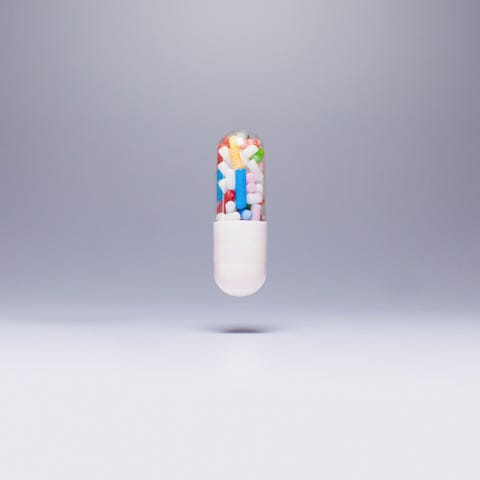You’re familiar with the fad diet cycle: Today’s keto diet is yesterday’s Atkins.
Well enter into the arena a diet called GOLO, which is shorthand for the plan’s mantra, “Go lose weight, go look great, go love life.” (See what they did there? The first four letters of each clause are “go lo”—cute!)
The GOLO diet is alike in that like many other diets it argues that it’s the only diet that will work for you. So if you’ve tried other diets before and “failed” then GOLO is going to be just perfect for you.
Go with GOLO and you’ll lose the weight you want, a claim the company backs up with testimonials of people who have lost more than 100 pounds on the plan.
But the GOLO plan is different from other diets in a few major ways.
One, the promises go beyond weight loss. GOLO also states that it will also boost your immunity and reset something called your “metabolic health.”
And, two, the GOLO diet builds itself around a supplement. That pill, called Release, helps dieters on the plan to achieve their weight loss goals, but also improve their overall health.
Critics of the diet say that there are serious problems with GOLO and Release, cautioning people away from the plan.
But it’s hard not to get drawn into the dramatic before-and-afters of people who have succeed on GOLO.
So who to believe?
We talked to experts to answer the biggest questions about GOLO: Does it work? Is it safe? And, what, exactly is life on GOLO like?
What, exactly, is the GOLO diet?
The GOLO diet suggests that spiked insulin levels are the cause of slow metabolism, which, in turn, is responsible for weight gain.
To take this a step further, GOLO argues that when you can control your insulin levels, you won’t store excess sugar in your blood, which your body then stores as fat. Regulated insulin levels equal regulated weight.
The company makes this claim based on a team of doctors and pharmacists, though the company does not disclose the names and affiliations of these experts.
To its credit, the GOLO diet, unlike Whole30 or keto, does not prohibit or severely restrict you from eating entire food groups, such as a sugars or carbohydrates.
Instead, the GOLO diet focuses on consuming whole, unprocessed, and unrefined foods. Specifically, at mealtime, a GOLO dieter would select one to two servings from each category—proteins, carbs, vegetables, and fats.
A GOLO dieter eats three meals a day, with breakfast and lunch meals larger than dinner. The diet permits snacks if you go longer than four to five hours between meals or if you exercise.
While this type of eating plan can work, this is where the GOLO diet starts to veer into questionable territory.
Supplement territory.
What is GOLO’s supplement, Release?
One of the core components of the GOLO diet is a supplement called Release. The company claims that Release will help kickstart your body’s ability to regulate insulin, increase your metabolism, and burn more fat.
Except here’s what’s actually in Release, according to the company: magnesium (15 milligrams in 1 capsule), zinc (10 mg), chromium (70 micrograms)*, rhodiola root extract, inositol, berberine HCl, gardenia, banaba leaf extract, salacia bark extract, apple extract, vegetable cellulose, dextrin, glycine, silica, citric acid.
*These three ingredients are the only three ingredients with amounts listed on the label. The amounts of these ingredients, however, are not disclosed because the formulation is patented.
GOLO markets Release as “plant-based” (whatever that even means.)
But then there’s the price of Release.
One bottle (containing 90 capsules) costs $60. Buy three bottles and you’ll reduce that fee to $120, but you can’t shop around for Release anywhere cheaper because you can only buy the supplement through the company.
Does the GOLO diet and Release actually work for weight loss?
Approach with caution, says Abby Langer, R.D., founder of Abby Langer Nutrition.
First, there’s the idea that eating certain foods can drastically improve your metabolic rate or overall “metabolic health,” Langer says.
In fact: “There’s nothing you can really eat to boost your metabolism to any degree that you will have a significant change in weight,” says Langer. “Your metabolism is dictated by genetics and muscle mass and, sure, hormones. But there are so many factors that something you eat won’t radically change it.”
Yes, theories do exist linking increased insulin and weight gain, but scientists still aren’t certain which hormones control metabolism and weight.
“It’s a theory for a reason. It hasn’t been studied a lot in humans,” Langer says. “We really don’t know definitively if insulin resistance is responsible for increased body mass.”
And while it’s true that the GOLO diet centers on whole foods, and its recommendations don’t require you to eliminate food groups, which is a smart way to eat—you don’t need the GOLO diet to eat this way.
And you surely don’t need a supplement to eat this way either, says Langer.
“Release is just a supplement. While it may not be harmful physically, I don’t recommend it,” she says.
Release is not a FDA-approved supplement for weight loss. (The FDA has granted approval for weight loss prescriptions, however, the list is slim.)
Does GOLO help boost immunity?
It’s not that simple.
Your immunity isn’t even something you can “boost,” and suggesting otherwise oversimplifies a complex system that depends on lots of things: exercise, sleep, stress, and also diet, but not only diet.
But what about GOLO’s success stories and research?
GOLO dieters have reportedly lost upwards of 100 pounds in just 12 months, and that can carry undeniable allure for someone looking to lose weight.
Except that that weight loss may have occurred not from GOLO’s proclaimed ability to help regulate insulin, but instead from switching from processed foods to whole foods, says Langer.
While GOLO leans heavily on the theory that insulin resistance slows metabolism, Langer cautions that there is no simple or accurate way to definitively measure a person’s metabolism. As a result, there is no way to measure the GOLO diet’s success.
“This is the hallmark of a fad diet,” Langer says. “You give the followers an outcome that they can’t measure.”
And the research cited by the company?
“The research studies done to support GOLO’s claims were small,” she says. “The studies were done by the company. None of their stuff has been published in peer reviewed journals.”
Rather than following one of these one-size-fits-all diets, Langer says the best path to an effective diet is to talk to a registered dietitian and carve out a plan tailored to you life, your goals, and your eating habits.
And consider this, as it pertains to all diets: If there was one diet on which everyone would lose weight and keep that weight off forever—wouldn’t everyone already be on that diet?
This content is created and maintained by a third party, and imported onto this page to help users provide their email addresses. You may be able to find more information about this and similar content at piano.io







Comments are closed.